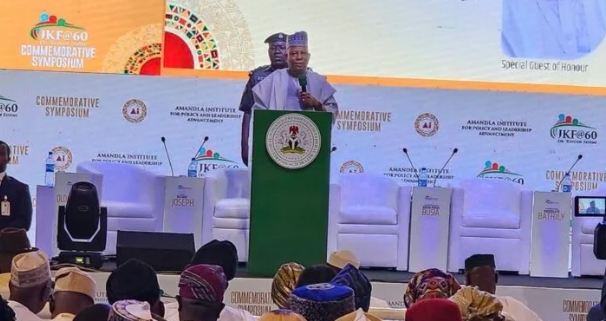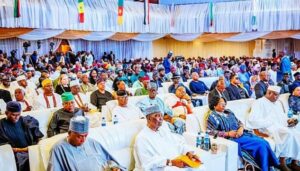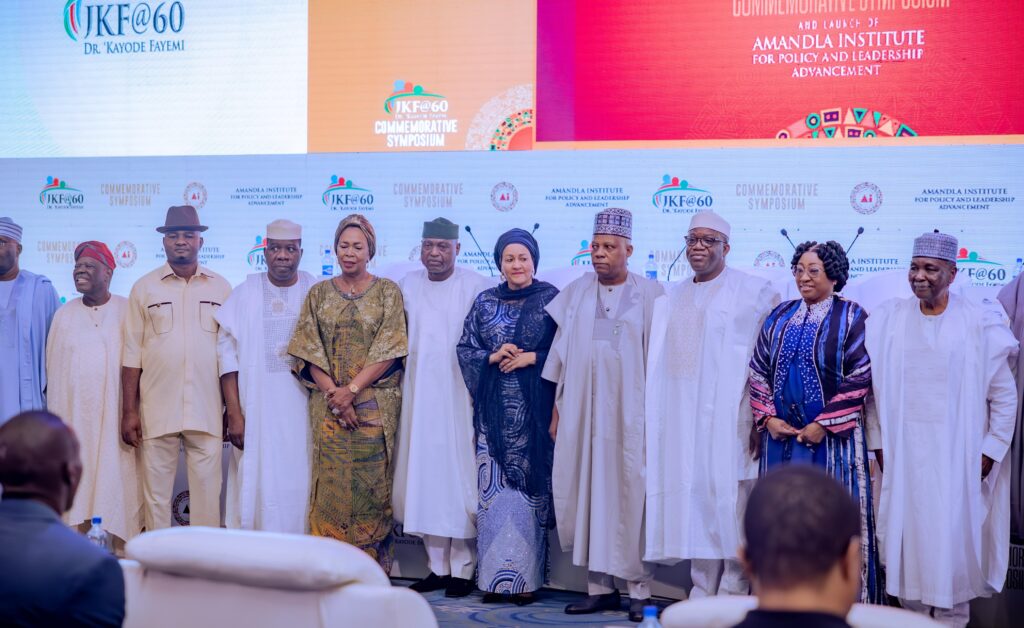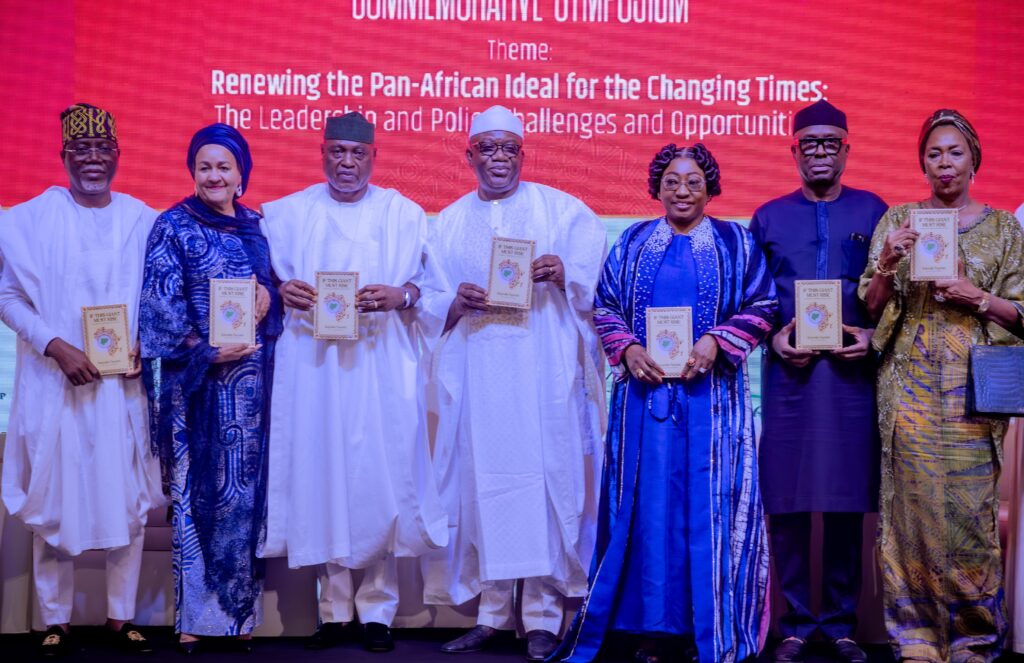Tinubu tasks African to stop depending on foreign blueprints
Nigeria’s President Bola Tinubu on Thursday joined former heads of state, governors and other prominent leaders to pay glowing tributes to the former Governor of Ekiti State, Kayode Fayemi, as he clocked 60 years.
The commemorative symposium was held in Abuja with the theme “Renewing the Pan-African Ideal for the Changing Times: The Policy and Leadership Challenges and Opportunities.”
Represented at the event by his deputy, Vice President Kashim Shettima, President Tinubu charged African leaders to stop clinging to their old habit of depending on foreign plans, saying the continent is in dire need of leaders who wield policy as a surgical blade instead of a slogan.
Vice President Kashim Shettima
Vice President Kashim Shettima
He lamented what he described as the “tragedy of our time,” in which African leaders not only confine themselves to foreign blueprints but also refuse to emancipate themselves from client-state mentalities and governance through hashtag activism.
“Whatever our differences across the continent, one fact that can’t be eroded by our infighting is that we are in the age of machines, and we can’t fight our development dilemma with spears and arrows while the rest of the world is fighting the same battle with missiles and tanks. The world is not waiting for Africa to catch up.”
The symposium also marked the official launch of the Amandla Policy and Leadership Institute, an initiative aimed at fostering leadership excellence and policy innovation in Africa.
Mr Fayemi and his wife, Bisi, founded the Amandla Institute to drive bold initiatives in harnessing leadership and policy for the transformation of the African continent and the progress of global Africa.
Dignitaries present at the event include the UN Deputy Secretary-General, Amina Mohammed; former Nigerian Head of State, Yakubu Gowon; former Vice President Atiku Abubakar; former Senate President Bukola Saraki; Governors Abiodun Oyebanji of Ekiti and Lucky Aiyedatiwa of Ondo; Senate Leader Opeyemi Bamidele; former Governors Emeka Ihedioha of Imo, Gabriel Suswam of Benue, Aminu Tambuwal of Sokoto, Chris Ngige of Anambra, Babangida Aliyu of Niger, and Abubakar Badaru of Jigawa; former APC National Chairman John Oyegun; the Ooni of Ife, Oba Adeyeye Ogunwusi and the Emir of Kano, Muhammadu Sanusi II.
Mr Tinubu urged African leaders to “evolve from custodians of power to architects of platforms,” adding that their “imagination of Africa must be one where every government ministry houses AI strategists, where continental trade policies are drafted by homegrown think tanks like Amandla Institute, not foreign consultants, and where “Made in Africa” signifies not raw materials but algorithms, green tech, and cultural capital.”
The Nigerian leader urged Amandla Institute to sell Africa to the world as a continent that seeks collaboration, and not patronage, stating that “the institute must become a command centre for the continent, turning thinkers into doers, policies into progress, and Pan-African ideals into lived realities.”
“We need leaders who wield policy as a scalpel, not a slogan. We need visionaries who see AI as a collaborator, not a competitor. We need a generation of Africans who recognise that Pan-Africanism, renewed for this age, must be rooted in actionable sovereignty.”
Earlier in his address, the keynote speaker, former South African President Thabo Mbeki, said development aspirations and targets across Africa have largely not been met due to a multiplicity of factors, including inadequate resource mobilisation and poor leadership. “The poverty and backwardness of Africa stand in stark contrast to the prosperity of the developed world… The New Partnership for Africa’s Development calls for the reversal of this abnormal situation by changing the relationship that underpins it.”
Mr Mbeki noted that the way forward, in the context of the establishment of a global multipolar order, is for African leaders to prepare adequately to position the continent correctly in order for it to participate actively in the determination of the global agenda.
“Our continent must pay particular attention to the development of the right leadership capable of defending and advancing our vast interests within the context of competing global players and in a situation of continuing globalization and institution of a multipolar order,” the former South African leader added.
He expressed optimism that the launch of the Amandla Institute for Policy and Leadership Advancement will go a long way in the actualisation of Africa’s ideals and increase her chances of participating actively in the establishment of multipolar order.
“Across the continent, Africans declare that we will no longer allow ourselves to be conditioned by circumstance. We will determine our own destiny and call on the rest of the world to complement our efforts.”
In her opening remarks, the Deputy Secretary-General of the United Nations, Amina Mohammed, said the establishment of the Amandla Institute is timely as the world battles complex challenges and conflicts.
“In Africa and the region, we are grappling with political instability, weakened democratic institutions and growing divisions between and within regions. These challenges not only undermine the progress in our sustainable development, peace and economic growth, but they’re also reversing the hard-won gains in these areas.”
Ms Mohammed urged African leaders to promote the values of pan-Africanism, unity, cooperation and shared progress more important than ever.
“Pan-Africanism reminds us that our future is interconnected and by working together across borders, we can create a prosperous and peaceful Africa. The opportunity today that we have in Africa is not just us rising, but it is also to bring the world back from the brink.”
The UN official said by fostering regional collaboration and harnessing leadership and policy for transformational change, the Amandla Institute is poised to drive the much-needed dialogues and actions that can prepare Africa towards sustained transformation.
“And let me just underscore the importance of dialogues, because unless we are listening to one another, we are expressing our views free from fear, free from, I would say, judgment. Unless we do that, we will not get the richness of that diversity, we will not get the leadership that we need that represents each and every one of us,” Ms Mohammed said.
“With its commitment to addressing leadership policy interface in Africa, the institute is set to be a key player in shaping the future of African governance, ensuring that the next generation of leaders is equipped with the knowledge, skills and visions to meet the challenges ahead and to reclaim Africa’s place in the world.”
The event also marked the public presentation of Mr Fayemi’s book: “If This Giant Must Rise.”
Drawing on his experiences as a scholar, civil society leader, governor, and minister, Mr Fayemi’s book discussed ways of tackling the continent’s pressing challenges.
The book examines critical issues such as insecurity, political instability, and growing inequality while offering actionable strategies for fostering peace, unity, and sustainable development.
The former governor situated Africa within the shifting global order, advocating for systemic reforms and a new generation of leaders to build a democratic, prosperous future while navigating a multipolar world.
